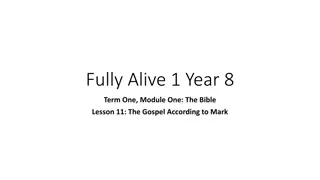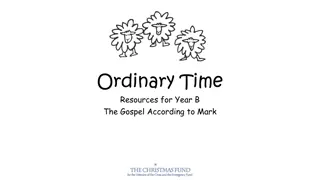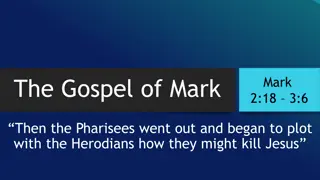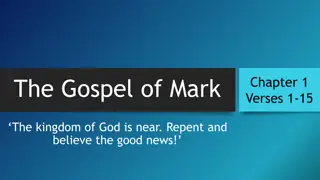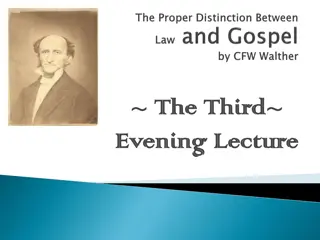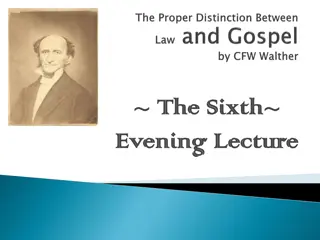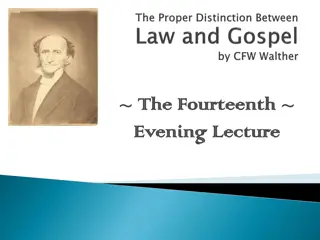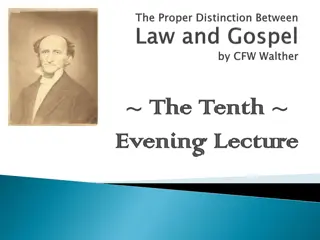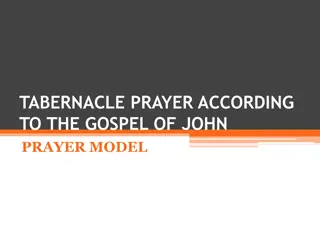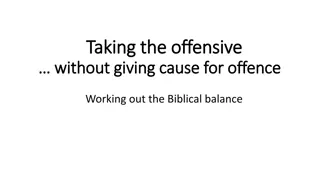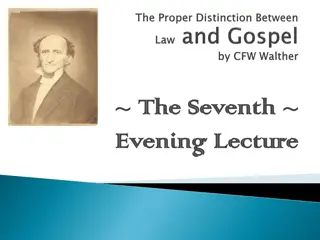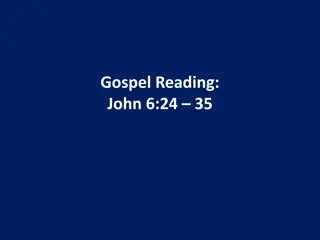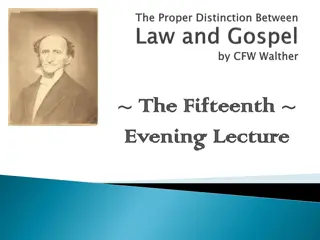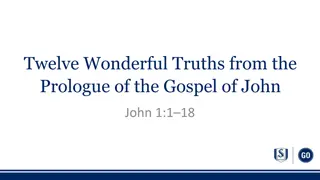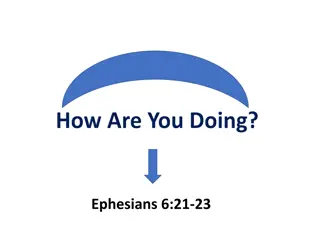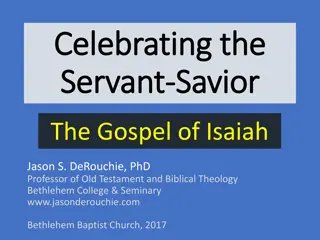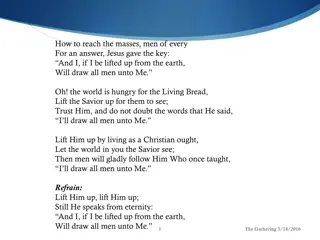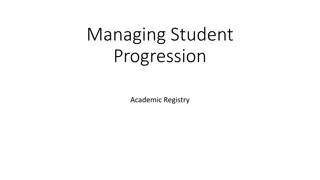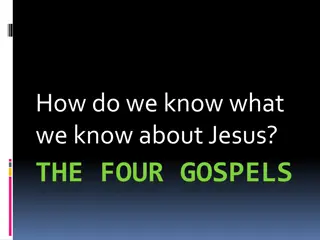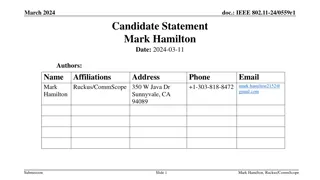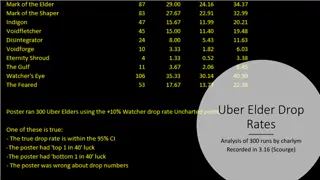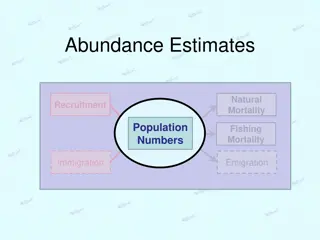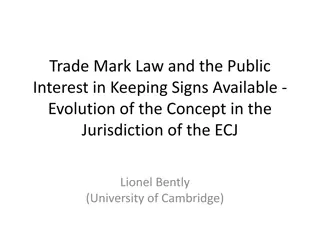The Beginning of the Gospel According to Mark
The Gospel of Mark presents a fast-paced and concise account of Jesus' life, emphasizing essential details for the modern era. Mark, a valuable figure in Christian ministry, was initially a "failed missionary" but later proved useful. The Gospel highlights the urgency of repentance and belief in the Kingdom of God, setting the stage for profound spiritual teachings.
Download Presentation

Please find below an Image/Link to download the presentation.
The content on the website is provided AS IS for your information and personal use only. It may not be sold, licensed, or shared on other websites without obtaining consent from the author. Download presentation by click this link. If you encounter any issues during the download, it is possible that the publisher has removed the file from their server.
E N D
Presentation Transcript
THE BEGINNING OF THE GOSPEL Lesson 1 for July 6, 2024
Now after John was put in prison, Jesus came to Galilee, preaching the gospel of the kingdom of God, and saying, The time is fulfilled, and the kingdom of God is at hand. Repent and believe in the gospel (Mark 1:14, 15, NKJV)
The gospel of Mark is the shortest of the four gospels that recount the life of Jesus. It is a fast, agile, dynamic, compressed story. The scenes flash before our eyes. You cannot miss any details, as only the truly important ones are included. In short, Mark is the gospel for the 21st century, where everything happens quickly and quickly, when time is money. Let us use that time to learn the most valuable thing: The gospel of Jesus Christ, son of God (Mark 1:1).
FAILED MISSIONARY Like the rest of the evangelists, Mark does not mention himself by name. He was a boy when the events he relates occurred, which he probably learned about through his intimate relationship with the apostle Peter (1 Pet. 5:13). John Mark's mother was the owner of the place in Jerusalem where the church gathered to pray on the occasion of Peter's imprisonment (Acts 12:12). Shortly thereafter, Barnabas and Saul (who had gone to Jerusalem to bring an offering) took John Mark to Antioch (Acts 12:25). In Antioch, when the Holy Spirit called Barnabas and Saul to be missionaries among the Gentiles, they took John Mark with them as a collaborator (Acts 13:2-5). But missionary life proved to be very hard for young Mark, who decided to return to Jerusalem (Acts 13:13).
USEFUL FOR THE MINISTRY Only Luke is with me. Get Mark and bring him with you, because he is helpful to me in my ministry (2 Timothy 4:11) When Paul proposed the second missionary journey, he refused to accept Mark as a collaborator (Acts 15:36-38). Paul needed strong helpers, who would be a support, not a burden. Mark did not fit this profile. However, Barnabas was sure that his nephew Mark, had enough potential to be a good missionary. So he took Mark with him to Cyprus, while Paul and Silas headed to Asia (Acts 15:39-41). We don't know what happened next, but we know that Barnabas was right. Through the three references he makes to him in his letters, Paul came to consider Mark useful for the ministry, an effective collaborator (Col. 4:10; Phm. 24; 2 Tim. 4:11). Thanks to this second opportunity, today we can enjoy the exciting story of Mark's gospel.
And this was his message: After me comes the one more powerful than I, the straps of whose sandals I am not worthy to stoop down and untie (Mark 1:7) Mark begins by introducing us to God preparing the journey of his Son (Mk. 1:1-2; Mal. 3:1). A journey that begins in the heavenly courts, and that will take Jesus Christ to the cross, to be received again in Heaven (Mark 16:19). To prepare this way, God chooses John the Baptist, the voice that cries in the wilderness (Mk. 1:3; Is. 40:3). Before Jesus began his journey to give his life for us, John prepared people's hearts by directing them to repentance and inviting them to be baptized (Mark 1:4-6). He prepared them to receive the son of God: more powerful than John himself; more worthy; and that he will baptize with a more effective baptism (Mark 1:7-8).
THE BAPTISM Jesus begins his journey in a spectacular way: God the Father presents him as his Son, and the Holy Spirit manifests his presence in bodily form (Mark 1:10-11). From the very beginning, Jesus is presented as a divine person, the Son of God. But he is also presented as a human person: He is baptized by John, and not the other way around (Mark 1:9) He need to be alone with God (Mark 1:13a) He is Face physical dangers (Mark 1:13c) He is Angels serve him (Mark 1:13d) tempted by the devil (Mark 1:13b) directed by the Spirit (Mark 1:12) This is how Jesus is presented to us: fully divine and fully human. He is both Savior and Brother, Lord and Example. It is the full revelation of God's love towards humanity.
The glory that rested upon Christ is a pledge of the love of God for us. It tells us of the power of prayer how the human voice may reach the ear of God and our petitions find acceptance in the courts of heaven.... The light which fell from the open portals upon the head of our Saviour will fall upon us as we pray for help to resist temptation. The voice which spoke to Jesus says to every believing soul, This is my beloved child, in whom I am well pleased. EGW (In the Heavenly Places - God Has Chosen Me, January 20)
THE MESSAGE After John was put in prison, Jesus went into Galilee, proclaiming the good news of God (Mark 1:14) 70 weeks = 490 years 62 weeks 434 years week week 7 weeks 49 years 7 years Jesus' initial message covered three aspects (Mark 1:15) The kingdom of God has come near repent and believe in the gospel "The time has come" A reference to the 70 weeks prophecy (Dan . 9:24). From the decree of Artaxerxes, year 457 BC, until the anointing of the Messiah, 69 weeks would pass (v. 25). This was fulfilled at the baptism of Jesus, AD 27. Half a week later, AD 31, Jesus died (v. 27). A call to take an active part in the covenant, by accepting forgiveness through faith in Jesus. A promise that the covenant of salvation was beginning to be fulfilled. Our current message also includes these three aspects: The time has been fulfilled; Jesus is coming; and we must repent and believe so we can go with Him.
The burden of Christ's preaching was, The time is fulfilled, and the kingdom of God is at hand; repent ye, and believe the gospel. Thus the gospel message, as given by the Saviour Himself, was based on the prophecies. The time which He declared to be fulfilled was the period made known by the angel Gabriel to Daniel As the message of Christ's first advent announced the kingdom of His grace, so the message of His second advent announces the kingdom of His glory. And the second message, like the first, is based on the prophecies." EGW (The Desire of Ages, pg. 233, 234)


